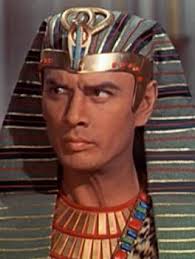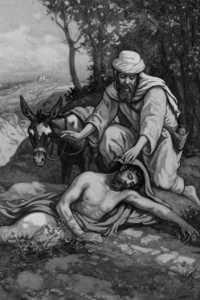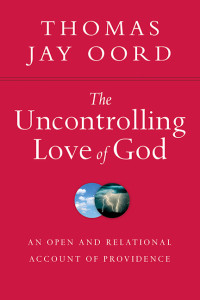Does the Bible Say God Controls?
I’ve been in conversation lately with people thinking through my theology of God’s uncontrolling love. Many like my view that God cannot control others. But they think the biblical writers say God sometimes controls.
Two examples of God’s alleged control often arise in our conversations. Both are claimed to be supported by the Bible. I want to explore both briefly and show that they don’t require us to think God controls creatures or creation.
Hardening Pharaoh’s Heart
The first example of God’s alleged control is a well-known passage about God “hardening” Pharaoh’s heart. Some biblical scholars, including Terence Fretheim, have argued that “hardening” does not mean God controls Pharaoh. “An act of hardening does not make one totally or permanently impervious to outside influence,” says Fretheim, “it does not turn the heart off and on like a faucet.” And, says Fretheim, “divine hardening did not override Pharaoh’s decision-making powers.”
In the Exodus story of Pharaoh, we find both the J(Y)ahwist and Priestly strands. Both portray the hardness of Pharaoh’s heart as his own negative reaction to signs from God. Both emphasize God triumphing over Egyptian deities. Brevard Childs concludes that the hardness-of-heart motif in Exodus “has been consistently over-interpreted by supposing that it arose from a profoundly theological reflection and seeing it as a problem of free will and predestination.”
I find it intriguing that “hardening” is the word English translators have chosen for the Hebrew word. As Fretheim, Childs, and other scholars note, “hardening” doesn’t explicitly mean “control.” The context suggests that God is doing something to Pharaoh, although Pharaoh also does something to himself. My main point is that we need not think of God’s activity in this story as involving complete control.
Miracles
The second example I often hear to support the idea that God sometimes controls is really a set of examples. That set comprises the miracles mentioned in the Bible. Many people think miracles require divine control. (Here’s a link to one of my previous blogs that defines miracles.)
Biblical scholars often divide miracles into “person/organism” miracles and “nature” miracles. In most person/organism stories, biblical writers explicitly mention the activity of the person or organisms involved. For instance, many miracles stories identify the faith of those healed or lack of faith of those not healed.
Other types of creaturely cooperation are also often mentioned in such stories. In person/organism miracles, it’s easy to imagine creaturely cooperation with God, which means God does not control others entirely to do a miracle.
Nature miracles are more difficult to imagine how creatures contribute to the miracle. We don’t think wind, waves, and mountains, for instance, make intentional responses to God’s miraculous activity. Nature miracles typically involve inanimate objects.
Interestingly, however, biblical writers often use anthropomorphic language when talking about nature. Wind and waves are said to “obey,” rocks “cry out,” the trees of the field “clap their hands.” Biblical writers were not afraid to anthropomorphize the inanimate objects that we today don’t think have responsive capacities.
In my book, The Uncontrolling Love of God, I offer ways to account for nature miracles using well-established theories in physics. In my work, I talk about God working in relation to nature. I don’t claim that inanimate objects make decisions or intentionally respond. I argue instead that sometimes the conditions and animate objects of nature are correctly aligned for God’s miraculous workings.
Perhaps most importantly, however, none of the nature miracles in the Bible EXPLICITLY say God controlled. The biblical writers don’t explicitly say God acted as a sufficient cause, unilaterally determined, or completely controlled creatures or creation. In other words, the Bible does not explicitly say God controls creatures or creation when acting miraculously.
An Uncontrolling Love Hermeneutic
I began this essay saying I’m in conversations about God’s uncontrolling love. Some people in these conversations are leading theologians.
I’m finding that Christians of various backgrounds, training, and experiences come to the biblical text with the assumption that God can control. They think God can act as a sufficient cause, to use the philosophical language. These Christians read various biblical passages – especially miracles stories and Pharaoh’s heart hardening – and then assume God controlled creatures or creation. The biblical passages don’t explicitly say God is controlling, however. But the assumptions about God’s power these Christians bring to the text make it difficult for them to interpret the biblical passages in light of what the words actually say.
All of this makes me think Christians need to consider reading the biblical text with a hermeneutic of uncontrolling love. Instead of thinking God has controlling power (which the Bible never explicitly supports), Christians should think God expresses uncontrolling love. I’m finding that reading the Bible through the lens of love makes the Bible come alive in ways that make sense and promote abundant life.
I first proposed the idea that God is inherently uncontrolling as a way to account for evil. But recently I’ve realized that thinking God expresses uncontrolling love can help us read the Bible better too.
Interpretation matters. And a hermeneutic of love matters a lot!
- Terence Fretheim, Exodus: Interpretation (Philadelphia: Westminster John Knox, 2004), 97.
- Ibid., 99.
- Brevard Childs, The Book of Exodus: A Critical, Theological Commentary [Louisville, KY: Westminster John Knox, 2004),

Comments
Genesis 1:1, “In the beginning God created the heavens and the earth.”
That passage appears to be controlling. God controlled everything into existence.
Just saying……
Thanks, Dart. That passage doesn’t explicitly say God controlled when creating. Neither does any other biblical passage that describes God creating. Most OT scholars I know would agree that the biblical text doesn’t explicitly mention divine control. Besides, the Genesis text you cite goes on to describe God’s creating as involving “hovering over the face of the deep” (1:2). Thanks for chiming in, though!
Perhaps an integration of more Buddhist thinking is in order. For the Buddhist control is an anathema to enlightenment and a serious hinderance to our thought processes.
The Bible talks about how all is held together in Christ, perhaps the integration of this line of thinking that God does not control but that God does bring a sense of wholeness to the universe without being in control is where your thinking is leading. Which also flows more with the Buddhist thought of non control. But then that would also necessarily flow back into how then do we define trinity and thus define more clearly who is God! Is atonement even necessary? Or is the real point oneness with God? Since if we think that God has no interest in control then we necessarily then should be asking then who God is and how are we to interact with God in the fullest manner possible? Given this line of thought we need to honestly consider redefining how we view God and our relationship to God.
Thanks for posting, Todd. You make some interesting points. I do not know enough about Buddhist thought to respond well. But I like the direction of your thinking.
I don’t imagine you are rationalizing away miracles like Bultmann might do, but I think a free will relational view can still hold to divine, supernatural intervention in creation or with creatures (perhaps like C.S. Lewis, Craig Keener, and others would argue). It sometimes seems to me your paradigm swings the pendulum too far from deterministic controlling when a more mediate/moderate view may be more biblical/coherent?
Tom, I think it would be helpful to walk us through some specific miracles of the New Testament. It seems that when the lame walk, the blind see, and deaf hear, that God is exercising authority over the physical realm. Even though in response to their faith or the faith of those who brought them to Jesus, doesn’t God exercise a degree of control over the cells that need healing or scales that need to fall from someone’s eyes? Unless you are suggesting, the lame are walking as the result of a placebo effect that triggered the body’s own capacity to heal itself.
I also think you need to explain why you think it is important to say the Bible does not say God explicitly controlled anything. It seems pointless. For instance, if I say, “I picked up my grandson and put him into his car seat.” A reasonable person would conclude that I controlled my grandson in some way for a moment. I may have even violated his free will if he was cranky or fussy. Of course, you could say my words did not explicitly say, “I controlled my grandson and put into his car seat.” Often miracles also present some act that could not happen without God controlling something–even if only the nerves in the spine of a paralytic. Saying that the paralytic looked to Christ with faith and therefore was not controlled by Christ misses the point that something in his body came under the control of God.
What would be more helpful is to explain why putting my grandson in the car seat does not constitute controlling him. My control certainly wasn’t complete; I did not stop him from protesting while I controlled where his body was lodged. I was also not controlling his physical functions–he spit up. I guess this points up the need for a definition of what exactly what constitutes complete control.
I am attracted to open theism because it allows the Bible to speak with its own voice. We have, however, clear language that speaks of Jesus exercising authority over sickness and evil spirits; commanding people to be healed and demons to be gone. I certainly don’t think Jesus is controlling people, but isn’t he exercising some control over evil spirits and physiology of those he healed? Aren’t many healings also nature miracles?
Thanks for chiming in, William. You’re right that I’m not following Bultmann. I’m taking miracles as real events. I don’t like “intervention” language, however, for a couple reasons: 1) it sounds like God was outside and then entered into a situation; I think God is omnipresent and 2) “intervention” can sound like God controls. As I’ve argued in many publications, a God capable of control is culpable for failing to prevent genuine evil. Finally, I think my paradigm is the more moderate/biblical/coherent paradigm.
Mark,
Thanks for your note. You make some good points, and I’ve addressed them in other blogs. You might google my name and “nature miracles,” for instance.
But let me address your grandson and car seat analogy (although I’ve also addressed this elsewhere). God and you are different in many ways. One is that you have a localized, physical body with which to pick up a grandson. God, by contrast, is an omnipresent spirit without a localized physical body. God cannot pick up your grandson, at least not directly. If God wants your grandson picked up, God would have to call someone like you with a physical body to do the picking up. Of course, those whom God calls could refuse to respond appropriately.
Even we with physical bodies don’t control others entirely. If you pick up your grandson and put him in a car seat, he can still cry out in protest or do other things you cannot prevent. So while you are exerting bodily impact in ways that he may not be able to stop, you are not controlling him in the sense of complete control.
In short, “control” as I’m using the phrase amounts to being a sufficient cause or unilateral determinater (to use the philosophical language). I don’t think God controls as either a sufficient cause or by acting in ways only those with localized physical bodies can act.
Thanks again for engaging these important issues!
Man has long tried to reconcile
the sovereignty of GOD with
the free will of man. GOD
calls, GOD chooses or elects,
GOD does as HE wills after
the intents of HIS heart ,
GOD’S plans and purposes
will always prevail !! GOD
reigns !!
Does it seem too subtle to you, Tom, to differentiate between the verbs “control” and “influence” where the action of love itself is concerned? To me, influence informs the other’s right decision to cause miraculous change. Control makes the other’s decision for him or her. Big difference in action but can have the same miraculous outcome, imho. Does, however, require God’s essential relationality as a basis for all miracles.
Yes, Dan, I often use “influence” as a contrast to “control.” And my reasons are like yours. Sometimes I’ll use philosophical language and distinguish between a cause and a sufficient cause. The latter unilaterally determines, while the former can be one among many causes.